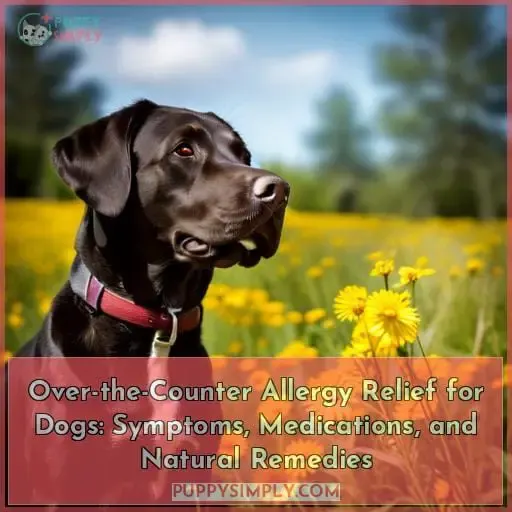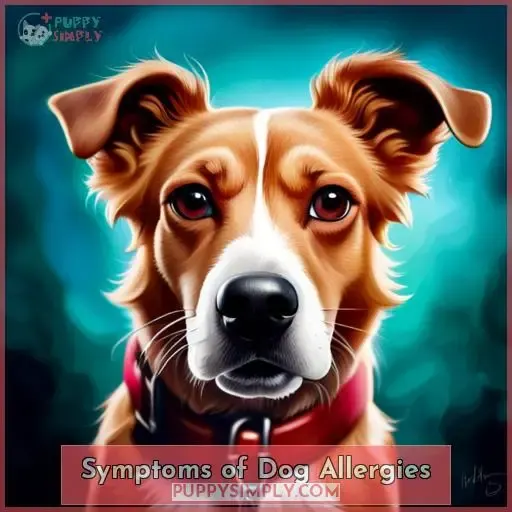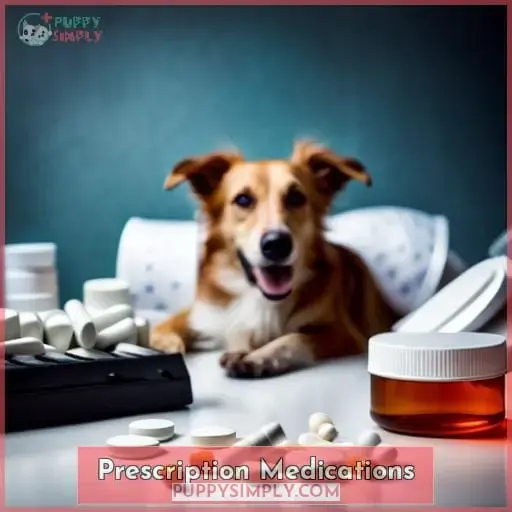This site is supported by our readers. We may earn a commission, at no cost to you, if you purchase through links.
 We’ve all felt the distressing tickle in our noses when Fido snuggles up too close. But before banishing your beloved pup, know there are ways to manage dog allergies without saying goodbye to Rover.
We’ve all felt the distressing tickle in our noses when Fido snuggles up too close. But before banishing your beloved pup, know there are ways to manage dog allergies without saying goodbye to Rover.
Antihistamines like Benadryl can provide fast-acting relief of itchy, watery eyes while daily vacuuming keeps irritating dander under control.
With some simple precautions, you and your furry friend can continue to enjoy each other’s company. The key is being proactive – keep symptoms in check before they spiral out of control.
By staying on top of medications, modifying your environment, and working closely with your doctor, you can keep allergies from detracting from quality time with your favorite pooch.
Table Of Contents
Key Takeaways
- Over-the-counter antihistamines, such as Benadryl, can be used to alleviate itchy, watery eyes in dogs with allergies.
- For more severe allergies, prescription medications are generally more effective.
- Supplements and natural remedies, like fish oil, probiotics, and herbal options, should be used cautiously, and it’s essential to consult a vet before using them.
- Consult a veterinarian for an accurate allergy diagnosis and a tailored treatment plan for your dog.
Common Dog Allergies
Allergies in dogs may develop from different sources. Common food allergies in dogs involve grains, meat, and dairy, while environmental allergies stem from factors like pollen or pet dander, and skin allergies arise from contact.
Food Allergies
You’ll want to check for food allergies like wheat or dairy if your pup has an itchy rash after mealtime. Veterinarian-guided allergy testing is a must to pinpoint the culprit. Then explore hypoallergenic diets, flea prevention, and natural remedies that ease symptoms without side effects.
But for lasting allergy relief in dogs, veterinary guidance is key – your furry friend’s health and safety comes first.
Environmental Allergies
A prescription should be your first choice if environmental irritants like grass, pollen, dust, or pet dander make your dog’s body react allergically. Environmental allergens often need allergy prescription medications to control dogs’ symptoms.
Talk to your veterinarian about the right medication and dosage for your dog’s size, breed, and allergy triggers. Natural remedies can supplement prescription treatment. Try to reduce exposure to irritants both indoors and during outdoor activities.
Skin Allergies
Skin allergies in dogs can lead to incessant scratching and sore, inflamed skin if you don’t treat ’em quick.
- Rubbing and scratching
- Chewing and biting paws and skin
- Hot spots and hair loss
- Recurring ear and skin infections
Look for anti-itch shampoos and antihistamines. Check for environmental triggers and avoid them. See your vet for allergy testing if scratching continues. While there’s no cure, you can manage symptoms long-term.
Symptoms of Dog Allergies
You likely notice your dog scratching or licking excessively. This incessant itching and scratching can lead to painful infections that require treatment. Excessive scratching and licking is a common sign of dog allergies. The constant irritation leads dogs to scratch, lick, chew, or rub their faces against furniture and carpets.
This behavior causes hair loss, lesions, open sores, and secondary skin infections that may require antibiotics or steroid therapy from your veterinarian. Limiting exposure to allergens and managing symptoms with medication can provide relief.
Itching
An itchy skin is no picnic for your pup, so try an oatmeal bath or hypoallergenic shampoo for some relief without meds. Identify allergy triggers, utilize topical treatments like coconut oil and aloe, and consider allergy prevention to help ease itching and discomfort.
Regular bathing with soothing ingredients can reduce symptoms without requiring over-the-counter allergy medicine for dogs. Focus on providing gentle, natural relief methods before resorting to allergy medication.
Scratching
You can’t stop fidgeting, clawing at yourself for some relief. The incessant scratching is so annoying but you have to resist tearing your skin up. Identify allergy triggers then use gentle natural remedies like oatmeal baths for relief.
Infections
You’ll want to keep an eye out for any worsening bacterial or fungal infections, as those can flare up when your pup is dealing with allergies.
- Keep wounds clean and dry to prevent infection.
- Monitor any rashes or skin irritation.
- Seek veterinary advice for antifungal creams if fungal infections develop.
- Schedule regular skin checks during allergy flare-ups.
- Contact your vet if infections worsen or do not improve.
Over-the-Counter Medications
Pet allergies can be extremely uncomfortable for your dog. To provide relief, consider using over-the-counter antihistamines like Benadryl or Zyrtec to reduce allergy symptoms without a prescription.
Antihistamines
Don’t despair, honey, Benadryl can offer sweet relief for your pup’s allergies. Antihistamines like Benadryl are commonly used as over-the-counter allergy medicine for dogs, combating itchiness from seasonal allergies.
Ensure proper dosages based on weight, starting with the lowest effective dose. Watch for potential side effects like sleepiness. Your vet can help determine the best antihistamine and dosage schedule for what to give your dog for allergies.
Antidiarrheals
When selecting antidiarrheals for your dog, Pepto-Bismol or Kaopectate can offer relief, but follow dosage guidelines carefully and watch for any adverse reactions.
- Start with small doses to gauge your dog’s reaction.
- Consult your vet to verify proper dosage for your dog’s weight.
- Only use for short-term relief, not for chronic issues.
- Watch for potential side effects like vomiting or constipation.
- Discontinue use if diarrhea persists for over 48 hours.
Seek prompt veterinary care if diarrhea is severe or accompanied by concerning symptoms like lethargy or loss of appetite to ensure appropriate treatment.
Prescription Medications
Prescription allergy medications from your veterinarian are the most effective treatment for managing your dog’s allergies. For dogs with chronic, severe, or recurrent allergies, these specialized medications can provide significant relief when over-the-counter options are insufficient.
Steroids
Steroid prescriptions may help treat your dog’s allergies. But be cautious, as up to 60% of dogs can experience side effects like excessive thirst and urination. Corticosteroids like prednisone are an option. But long-term use can weaken the immune system and damage organs.
Use the lowest effective dose for the shortest time. Weigh risks and benefits with your vet.
| Steroid Use in Dogs | Potential Side Effects |
|---|---|
| Short-term (days to weeks) | Increased thirst, increased urination, increased appetite, panting |
| Medium-term (weeks to months) | Muscle wasting, pancreatitis, intestinal ulcers, liver issues |
| Long-term (months to years) | Cushing’s disease, diabetes, cataracts, infections, osteoporosis |
Other Rx
Meds like cyclosporine can help when over-the-counters aren’t enough, but you all need a vet’s guidance. In certain tough cases, vets may prescribe stronger prescription medications to ease allergic reactions beyond what OTC antihistamines can do.
These include steroids like prednisone or prescription non-steroids like Atopica. However, long-term steroid use carries risks, so thoroughly discuss options with your vet.
Supplements and Natural Remedies
You’ll find a variety of over-the-counter supplements and natural remedies that can provide allergy relief for your dog. Fish oil, probiotics, and herbal remedies such as peppermint and chamomile may help reduce allergy symptoms like itchiness, though you should consult your veterinarian first regarding appropriate use and dosage.
Supplements like omega-3 fatty acids from fish oil can help reduce inflammation associated with allergies. Probiotics may improve your dog’s intestinal health and immune response. Herbal remedies like peppermint and chamomile have anti-inflammatory and anti-itch properties.
However, always check with your vet before giving your dog any new supplements or herbal remedies, as they can interact with medications or may not be appropriate depending on your dog’s health conditions.
Your vet can advise you on safe dosages and whether a natural remedy is likely to help your individual dog. With your vet’s guidance, these over-the-counter options may provide additional allergy relief and support your dog’s overall health.
Fish Oil
Keep your dog’s diet balanced with fish oil’s omega fatty acids, supporting anti-inflammatory effects that may relieve allergy symptoms. Omega-3s from fish oil can modify the immune response to reduce the risk of allergies without the side effects of drugs.
It is recommended to give 1,000mg of fish oil per 30 pounds of your dog’s weight to curb scratching, itching, and joint pain.
Probiotics
You’d be barking up the wrong tree if you didn’t give probiotics a shot for Fido’s allergies.
Probiotics offer natural allergy relief by balancing your pup’s gut flora. They support digestive balance, promote gut health, strengthen the microbiome, reduce skin irritation, and boost immunity. Consult your vet on the best probiotic supplement for optimal microbiome support and digestion.
Herbal Remedies
Find how chamomile tea’s calming effects can ease your pup’s itching. Herbal remedies like:
| Herb | Benefit | Precautions |
|---|---|---|
| Chamomile | Anti-inflammatory, calming | Rarely toxic |
| Oregano | Antibacterial, antifungal | Can be toxic |
| Thyme | Antiviral, antiseptic | Use diluted |
Offer natural allergy relief, yet exercise caution with dosing. Consult a holistic vet when using plant-based remedies for your pup’s type-1 hypersensitivity reactions.
Managing Allergen Exposure
To minimize your pet’s exposure to allergens, consider making simple changes in your home environment.
Regularly clean your pet’s bedding and your home, using a vacuum cleaner equipped with a HEPA filter to trap allergens effectively. Wash your pet’s toys and belongings frequently, and opt for washable pet bedding to reduce allergen buildup.
Additionally, allergy testing can pinpoint specific triggers for your dog’s allergies, allowing you to tailor your approach. An allergy-free diet may be recommended based on test results, ensuring your pet gets the nutrition they need without allergen exposure.
Reducing allergen sources in your home, such as dust mites and pet dander, is essential. Regularly clean and dust your home, and consider using air purifiers with HEPA filters to maintain cleaner indoor air.
For symptomatic relief, corticosteroid nasal sprays and decongestant nasal sprays can help manage allergy symptoms effectively. These adjustments in your pet’s living environment, along with the best treatments, can significantly improve their quality of life in an allergy-free, pet-friendly home.
When to See the Vet
Now that you’re armed with the knowledge of managing allergen exposure, let’s delve into a critical aspect of caring for your allergic dog: When to See the Vet. Your dog’s well-being depends on timely professional guidance, especially when dealing with allergies.
Veterinary Consultation: Before you even think about reaching for over-the-counter allergy medicine, it’s imperative to consult a veterinarian. Your dog’s health is paramount, and a professional can provide a precise diagnosis and a tailored treatment plan.
Allergy Diagnosis: Recognizing allergy symptoms is one thing, but an accurate diagnosis requires a skilled hand. Veterinarians may conduct allergy skin tests or blood tests to pinpoint allergens. This information is vital in determining the most effective course of action.
Emergency Situations: If your dog ever faces an allergy-induced emergency, like severe swelling or difficulty breathing, don’t hesitate. Rush to the vet immediately. These situations can escalate rapidly and require swift, expert intervention.
Eye Health: Eye issues can be an allergic reaction in dogs. Keep a vigilant eye on your pet’s ocular health. Squinting, blinking, or redness could signify problems that necessitate prompt veterinary attention.
Allergen Minimization: Work closely with your vet to develop strategies for minimizing allergen exposure. This might involve changes in your dog’s diet, lifestyle, and environmental conditions.
Caring for Your Dog
Ensure your furry companion’s well-being by following expert advice on caring for them.
When it comes to dog grooming, regular brushing not only keeps their coat in good condition but also strengthens your bond.
Training your dog is essential, instilling good behaviors and manners, making your life together more harmonious.
Adequate exercise is crucial; it not only maintains physical health but also prevents behavioral problems. Take your dog for walks, engage in play, and provide mental stimulation through puzzle toys.
Don’t overlook dental care – brushing their teeth or offering dental chews can prevent dental issues.
Addressing behavioral problems promptly is vital. Consult a professional trainer if needed.
Keep a watchful eye on any signs of distress or unusual behavior.
Conclusion
To put it simply, when it comes to managing your dog’s allergies, remember the adage: An ounce of prevention is worth a pound of cure. In this comprehensive guide, we’ve explored common dog allergies, their symptoms, and various solutions.
While over-the-counter allergy medicine for dogs, like antihistamines, can provide relief, it’s crucial to consult a veterinarian first. Don’t forget the importance of managing allergen exposure and considering prescription medications or natural remedies like fish oil and probiotics.














